

This week Ali Capper and her colleagues at British Apples & Pears Ltd hosted a meeting at The Barnyard at Gore Farm Upchurch
The Barnyard - Gore Farm Upchurch
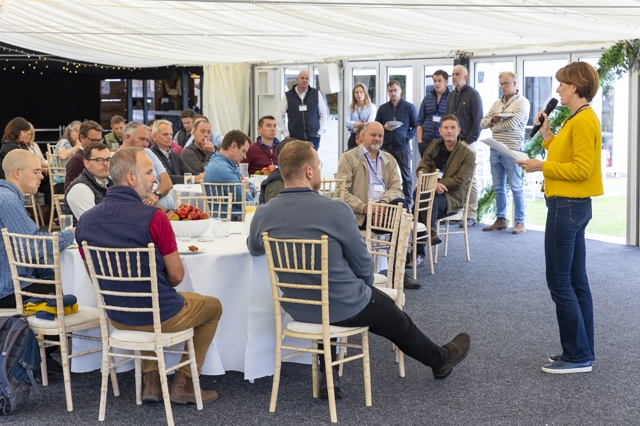 "It is a pleasure to be able to welcome you all (our retailers, Defra, NFU, the media, our local MP, our Board and Promotions Committee) to this beautiful part of Kent, to the AC Goatham & Son business, to British orchards right in the middle of our harvest.
"It is a pleasure to be able to welcome you all (our retailers, Defra, NFU, the media, our local MP, our Board and Promotions Committee) to this beautiful part of Kent, to the AC Goatham & Son business, to British orchards right in the middle of our harvest.
I have a few things to cover before we take a walk up the hill to look at a stunning view of British apple orchards.
We have exciting news to share today on the winner of British Apples & Pears awards for Supermarket of the year and Most Improved Supermarket of the year.
While The English Apple Man took some of the photographs in today's Journal, many were taken by my friend Martin Apps of Countrywide Photographic. See link for Martin at bottom of Journal.
Ali Capper continues------
"And I want to talk to you about the key issues facing our growers and the opportunities.
The first two key challenges are quite different but there is a common theme - they both need collaboration and consistency to be resolved.
To overcome these challenges we want to collaborate, convene and work together with you to find sensible, workable and low-cost solutions but most importantly we need consistency for the sector from you all.
Most of the businesses we represent pack for more than one customer. If each customer makes different demands - different numbers of apples in a pack or different types of packaging for example, this can create much more work, complexity and
capital investment for our members - this all adds cost to each pack of apples!
We want British apples and pears to be the first choice for shoppers - for their value for money, their great taste and their health benefits. To remain competitive in the fresh produce category we would ask that on these two critical issues we work together to find the right solutions:
1. The Employer Pays Principle - Sedex Smeta 7.0 - an audit for a standard that the sector cannot meet lacks common sense! Our SWS does not require that travel and visa costs are funded by employers so why are auditors going to be asking
the question? The Defra-funded feasibility study of the EPP will not report until the middle of 2025. We want you to all commit that no action will be taken on any CAR's given against this standard and we wish to call out the unethical approach
that we believe Sedex has taken to the introduction of this standard. 84% of growers were not consulted.
2. Flow wrap Packaging - we will be convening a meeting with you all, with Defra and WRAP to reach consensus on the right routes forward. Apologies for the delay in confirming dates for the meeting, it is taking a bit of coordination. The
current film that is in use is recyclable but not at kerbside until 2027. The sector should align around one solution, not multiple solutions, to solve the plastics challenge. Loose fruit is not necessarily the answer - the consumer still requires a bag; trials show loose fruit delivers significantly lower sales and increases write o s in retail.
Our third and biggest societal challenge is climate change, and we are all facing into it, striving to find solutions, for example:
*New drought, pest and disease tolerant varieties that also colour in warmer climates
* Investing in field scale drainage to mitigate against torrential rain
* Investing in renewable energy
* Utilising our R&D funds to undertake the Lifecycle Analysis of British grown Gala apples and
* Investigating the feasibility of Biochar as a solution to burning wood at the end of orchard life.
Climate change is challenging the security of fruit supply chains with WAPA's EU forecasts on red across almost every country - indicating that the continental climate will only become more challenging for fruit growers.
In many ways climate change is an opportunity for British farming. We want to take advantage of the opportunity of farming in a maritime climate. We want to reset our ambition to achieve 60% market share for British apples in UK supermarkets by 2035. We want you to invest, to commit, to provide the business confidence for the sector which wants to double its hectarage in the next 10 years.
In 2012/13, British apples were just 17% of all apples sold in British supermarkets. By 2022/23 this had peaked at 32% market share - a phenomenal achievement by British growers. This was achieved with almost no change in the overall hectarage of orchards. It was achieved through massive productivity gains of closer planting which achieved significantly higher tonnage per hectare. The productivity gains have plateaued and the impact of covid and inflation have taken their toll on the profitability of our apple and pear
businesses.
To achieve 60% market share we now need to double the hectarage, to invest in land, to invest in new orchards. Orchard infrastructure costs are high with a commercial dessert fruit orchard costing £100,000-170,000/hectare to establish (costs relate to land, drainage, groundworks, trees, post and wire, hail protection, bins, storage etc).
To double the current hectarage will cost £550-935 million in today's money. So, if you want a strong supply of British-grown fruit, we need commitment, long-term partnerships and profitable returns.
As Aldi has demonstrated this year, with the announcement of their 20-year deal with AC Goatham & Son Ltd, we know these deals are possible to achieve. The government will also need to provide a longer-term commitment on labour than the current five-year timeframe and grant funding to assist our growers and packers to automate wherever possible.
So, please talk to your suppliers about long-term commitments, about multi-year agreements, about joint investments and about doing all of this whilst reducing our carbon footprint.
Orchards have a great story to tell - trees are in the ground for 15 to 20 years with almost no soil movement during that time... a great way to sequester carbon and produce apples and pears which are both in the top 5 (out of 52 fruits and vegetables) for
metabolic quality - preventing heart disease, diabetes; providing hydration, fibre and great gut health.
Supermarket of the Year
Below: left. TESCO win Retailer of the year September 2023 and August 2024 and right. The winner of the Year-On-Year award is Lidl.
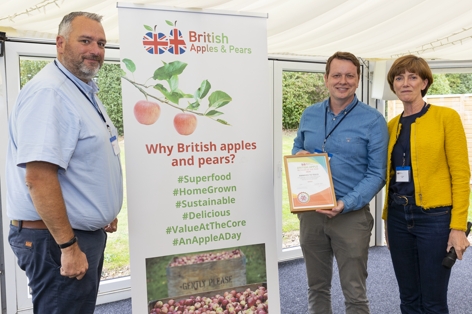
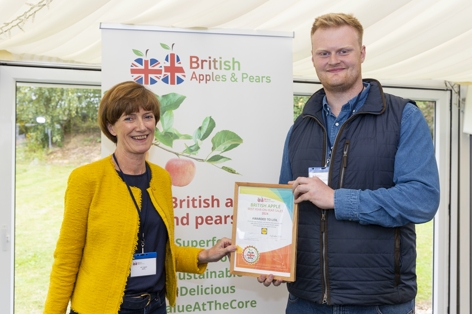
The race for the highest sales of British apples by a retailer this year has been neck and neck almost all the way through the season. Thank you all for working so hard to sell British apples. A big thank you especially to those retailers who have significantly over traded against their UK grocery market share in selling British apples. Aldi, Lidl, Sainsburys, M&S and Waitrose have all overtraded in British! Thank you.
So, to the presentation of our awards:
Our winner for the most British apples sold between September 2023 and August 2024 is Tesco. Congratulations Tesco - you told me last year that you wanted to win this prize and you kept to your word!
"Now Tesco let me set you a real challenge for the next 12 months! The 5 retailers below you this year all sold over their respective market shares, Aldi actually sold more than double theirs! Let's see you join this club and sell more apples and pears than your
market share."
Our other winner for the 2023 season is the only retailer who has sold more apples than last year. This is a huge feat given that we had a smaller national crop in 2023 than we did in 2022. The winner of the Year-On-Year award is Lidl.
But we also know that there is more that our retailers can - and want to do. Many supermarkets are not selling as many British apples as they were 10 or more years ago.
Asda sold 12k tonnes in 2012 and only 7k in 2022. Morrisons sold 18k in 2012 and just 5k in 2023. Waitrose has also fallen back to 7k tonnes in 2022 compared to 13k in 2014.
We want all our wonderful supermarkets to get back to their heyday volumes and overtrade in British apples.
The 2024 crop looks fantastic with great colour, amazing flavour, and fruit that has sized up nicely. There are some quality issues with russeting issues affecting 16% of the Gala and 28% of the Cox crop - we would like you to share them around equally in the main
packs, rather than see these go to "wonky" lines or juice and jeopardise grower returns!
Below: left. Trees laden with beautiful Gala and right. an example of russet on Gala surface (20%) hopefully acceptable to Supermarkets
"We know that as a collective our members and your retail teams have been working really hard to give British the support it deserves instore at the start of our season. Lidl provided amazing support last year with a TV advertising campaign and social campaign to promote apple orchards and their growers. Thank you Lidl. We are confident that you can all do more to bring back the in-store theatre that we used to see 10-15 years ago - more union jacks, more celebration of the start of the British season and we are looking
forward to seeing what October looks like in all the stores.
On social we will be promoting your branded packs and continuing to focus on
#OrchardWatch, #Superfood and #An Apple a day. We will be focusing on taste, flavour and health.
Thank you to Ross, Steve, Nigel and all of the AC Goatham team for hosting us today and to The Barnyard team for a delicious lunch. We will be serving tea and cakes before you depart. Thank you all for coming today and we hope you enjoy your tour of the
orchards and seeing harvest in full swing on this beautiful farm.
Below: left. Ross Goatham gives an overview of the ACG business and previews the orchard walk. and right. BAPL apple and pear display
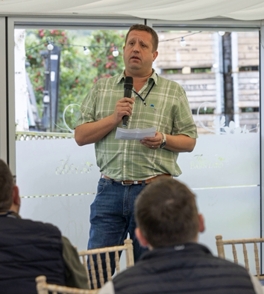
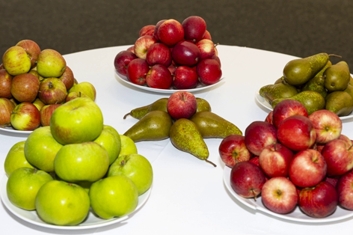
Below: left and right. The Barnyard produced a very tasty buffet lunch - much appreciated by us all!
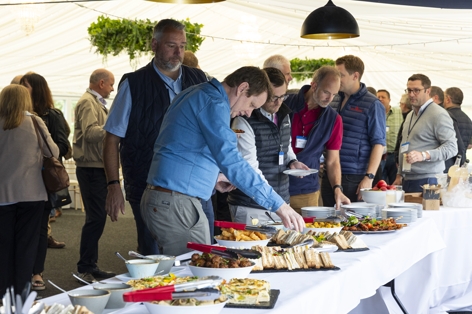
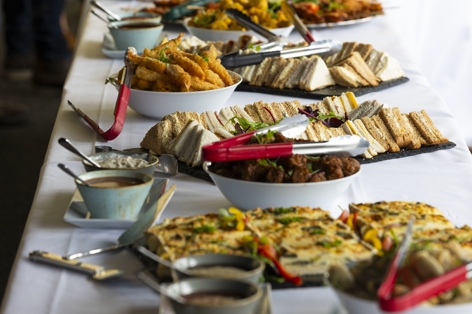
Below: BAPL attendees view the main orchard area from the hillside - this huge grassy bank will be festooned with wild flowers next summer
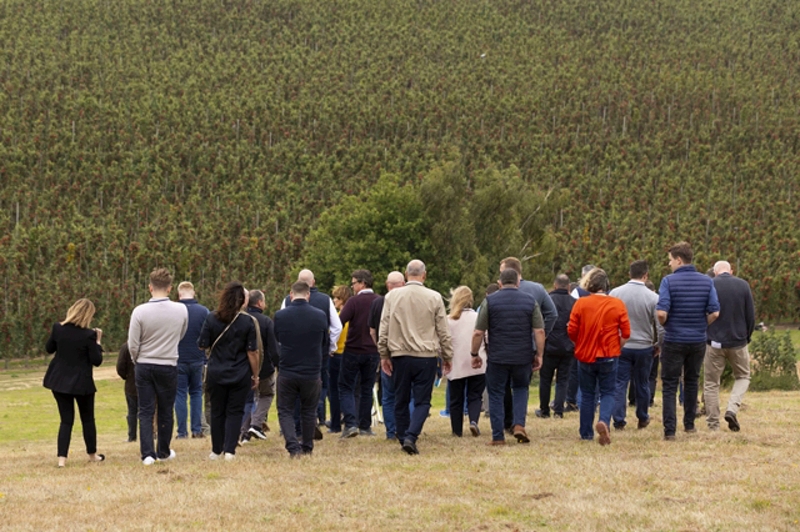
Below: picking is split into two operations: 1. by hand into picking bucket then placed gently into bulk bins on picking trains or 2. Using semi-automatous harvest machines where pickers place the hand picked apples on to moving belts which carry the fruit gently into a bulk bin.
Below: left. emptying picking buckets into bulk bins and right. the group were able to observe harvesting close at hand
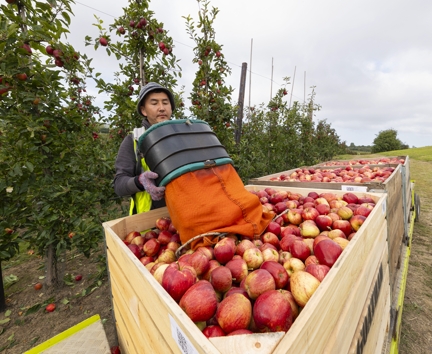
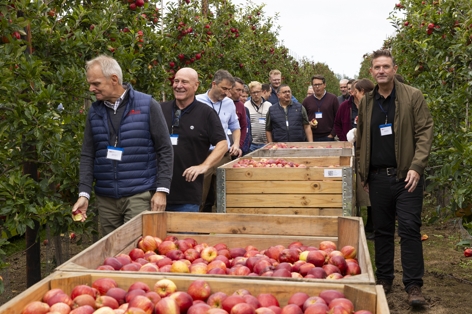
Below: picking is split into two operations: 1. by hand into picking bucket then placed gently into bulk bins on picking trains or 2. Using semi-automatous harvest machines where pickers place the hand picked apples on to moving belts
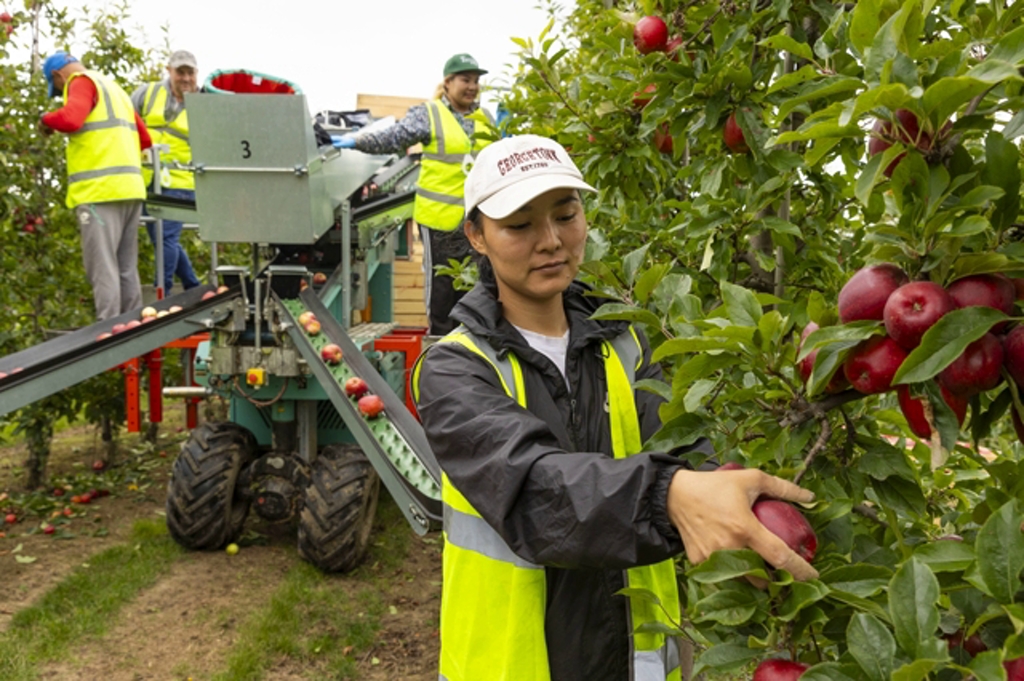
Below: left. a perfect bunch of Gala apples and right. Gala with severe skin russet (but still perfectly edible) likely destined for the juice bin
Below: a 'vintage' Massey Ferguson tractor earns its keep at harvest time pulling picking trains
I was grateful to tour the orchards with Clive Goatham in his Land Rover Discovery (my mobility is worsening) and I could not resist portraying this wonderful old tractor not quite my age but I would still have been at school when this 'legend of the tractor world was made' - My delight brought a comment from Clive; "we have over 150 of them" - what Massey's I quipped" - no 150 tractors he replied!
Not surprised, the size of the AC Goatham business requires a lot of machinery and Clive told me they have a team of engineers working full time across the year, servicing and maintaining the farm machinery.
After the 'doom and gloom' of last year, I felt some positivity among those present; growers, retailers, civil servants et al.
The apple and pear industry is very fortunate to have Ali Capper leading the BAPL team. Ali is fortunate to have a very loyal Board of Directors all of whom are very experienced in the political aspect of our industry.
It was good to talk with representatives of major retailers, DEFRA a local MP and a strong media presence to 'spread the word'
Click on BAPL for more information
Click on AC Goatham & Son
Click on: Countrywide Photographic
![]() That is all for this week
That is all for this week
Take care
The English Apple Man